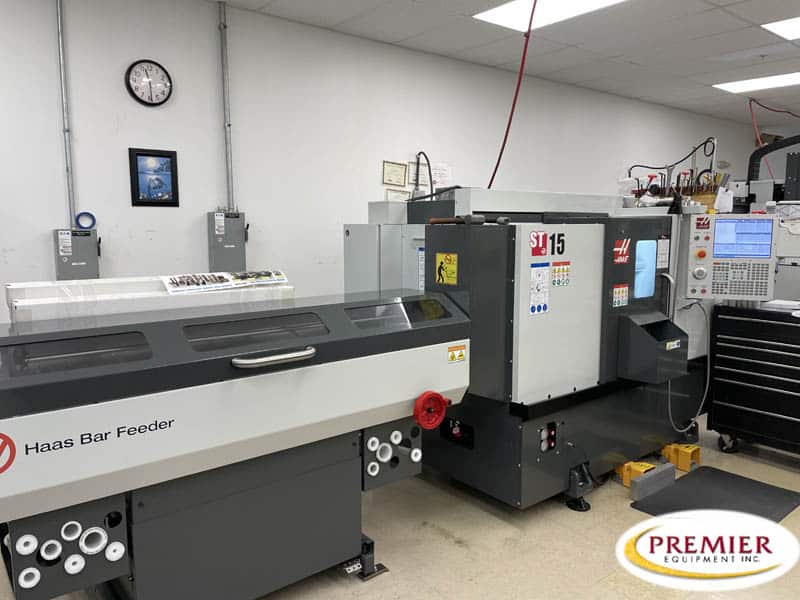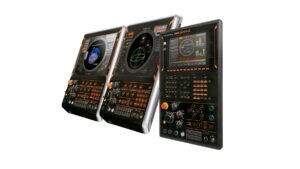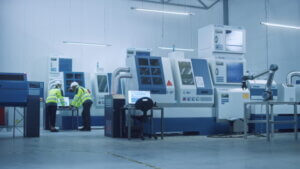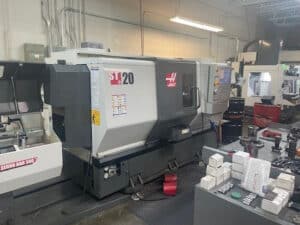When you need to create precision components and cylindrical parts but don’t have the room for a full-sized lathe, a CNC mini lathe may be just the tool you need to support your part-production processes.
As the name suggests, mini lathes are simply scaled-down versions of traditional lathes, which rotate the subject material around an axis and use a fixed cutting tool to carefully remove materials from the “blank,” or the workpiece, in other words.
If you’re not entirely sure whether a mini or full-sized CNC lathe is the right fit for your needs, join us as we explore mini lathes, discuss how they compare to standard CNC lathes, and provide some tips for purchasing quality used equipment. Our goal is to help you find the ideal CNC solution for your project.
How Does a CNC Mini Lathe Work?
Like traditional lathes, a mini lathe includes a chuck, tailstock, and a cutting bit or tool. The material is locked into the chuck and rotated along a single axis. Then, the cutting tool is moved across the blank until it removes enough material to create the desired shape for the piece.
Mini lathes are often operated by hobbyists and are also a staple in many CNC machine shops, where they are used to make intricate jewelry, race car components, robotics hardware, and more.
Main Differences Between Mini Lathes vs. Lathes
The key difference between lathes and mini lathes is their sizes. The small footprint of mini lathes makes them suitable for smaller or more crowded facilities. A mini lathe is a scaled-down version of a commercial CNC lathe, small enough to fit on a benchtop.
Typically, mini lathes have a “between-centers” distance of 20” or less, which simply means that there is no more than 20” between the tailstock and lathe chuck. In addition, mini lathes have a maximum swing of 12”. The swing represents the largest diameter blank that the mini lathe can turn. For instance, a mini lathe with a swing of 10” can accommodate workpieces with a diameter of 10” or fewer.
The other significant difference between a mini lathe and a standard lathe is cost. Naturally, mini lathes are more affordable than their full-size counterparts.
The Different Types of Mini Lathes
There are two main types of mini lathes: mini wood lathes and mini metal lathes.
Mini wood lathes can be used to shape wood, as well as other similar, soft materials like wax and plastic. On the other hand, a mini metal lathe features more robust cutting tools and a faster rotation speed, which allows it to shape metal blanks. Many mini metal lathes can also be used to shape soft workpieces.
Best Uses for Mini Lathes
Mini lathes are a great fit for your shop if you lack the floor space for a commercial lathe, given that most mini lathes can be attached to a workbench. Even if you purchase a mini lathe with an independent stand, it will have a smaller footprint than commercial machinery.
Mini lathes are best suited for small-batch manufacturing. You can use these versatile machines to make jewelry, race car parts, avionics components, and much more.
Industries that Use Mini Lathes
A few industries that use mini lathes include the following:
- Aviation: Small-scale aviation manufacturers may use mini lathes to produce custom, prototype, or limited-run parts, benefitting from the versatility and affordability that mini lathes provide.
- Automotive: Race car mechanics and other small businesses in the automotive space use mini lathes to fabricate precision parts. With a mini lathe, mechanics can carefully replicate damaged components and produce vital parts in-house.
- Robotics: Robotics startups frequently need unique, one-off parts. Mini lathes, therefore, are a valuable tool, allowing them to create the exact components they need for their robot designs.
- Jewelry: Due to their size, mini lathes can be used to create intricate jewelry parts and are small enough to fit in a jewelry store’s repair room.
Hobby machinists also frequently used mini lathes to work on wood or metal projects. The affordability and versatility of mini lathes make them a great addition to any hobby machinist’s garage or private workshop.
CNC Mini Lathes: Buying Used Machines
A used CNC mini lathe can be a great investment, though there are a few things you need to consider before making a purchase. Let’s explore some of these factors so you can get the most bang for your buck.
Key Factors to Consider When Purchasing a CNC Mini Lathe Include:
Size and Capacity
Ensure that the mini lathe you are considering can fit in your workspace. Also, verify that it can accommodate the size of workpieces you need to manufacture.
Motor Power and Speed
Motor power and rotational speed will impact part quality and production efficiency. Compare the power and speed of several top mini lathe brands before making your final decision.
Control System and Software
The best mini lathes will include user-friendly control systems and built-in software so that you can put the device to use as soon as it arrives.
Tooling and Accessories
Determine whether the lathe can accommodate multiple tools or accessories. Purchasing a lathe that can do so will maximize your ROI and give you the freedom to tackle a wider range of projects.
How to Inspect a Used CNC Mini Lathe
Before finalizing your purchase, you should inspect the used CNC mini lathe to ensure it is a safe buy for your shop. During your inspection, you should do the following:
- Check the machine’s condition and overall appearance
- Verify that it runs
- Examine its maintenance history
Top CNC Mini Lathe Brands
If you have ever looked up a phrase like “mini lathe for sale,” then you know firsthand just how many different brands of mini metal lathes are available. The same goes for mini wood lathes.
The question, then, lies in knowing which brand of mini lathe will offer the best return on your investment, and the answer will largely depend on what you intend to use your mini lathe for and the materials you will be working with.
However, you can set yourself up for success and find mini lathes to support virtually any use case by choosing a reputable brand such as one of the following:
Mazak
Mazak is a Japanese CNC lathe manufacturer that produces both mini lathes and commercially-sized equipment. Mazak also provides customers with a software solution that seamlessly integrates with its quality hardware, and the manufacturer is renowned for providing exceptional support and standing behind its products.
Haas
Haas is among the largest North American CNC equipment manufacturers. In addition to mini lathes, Haas also produces commercial lathes and CNC mills. Local support teams are a phone call away should clients encounter an issue with their equipment.
Doosan
Doosan is a South Korean CNC mini lathe manufacturer that produces ultra-reliable equipment, including 5-axis machining centers and other state-of-the-art CNC equipment. Its machines are powered by the company’s user-friendly CAD software.
DMG Mori
While the German manufacturer DMG Mori produces a full line of CNC equipment, it is best known for its high-quality lathes. Like its commercial line, the brand’s mini lathes are easy to use, reliable, and built to last.
Okuma
Founded over 100 years ago, the Okuma brand has a wealth of experience developing CNC manufacturing equipment, and every Okuma product, including its mini lathes, is equipped with the company’s robust CAD software. The company is known for providing exceptional product support as well.
Makino
While Makino is best known for manufacturing leading-edge electric discharge machines (EDMs), it also has a line of lathes and mini lathes, which the Japanese brand has been producing for decades.
Nakamura-Tome
Japanese-based Nakamura-Tome’s mini lathes are available in several different configurations, and the company pairs its lathes with user-friendly software that makes designing parts effortlessly.
Hyundai-Wia
Hyundai-Wia is the CNC machining arm of Hyundai Corp., specializing in producing CNC mini lathes, commercial lathes, and turning centers. Whether you need tabletop equipment or full-sized machinery, Hyundai-Wia’s products are an excellent choice.
Kitamura
Kitamura is another well-respected Japanese CNC machine manufacturer. With offices in the USA and Germany, Kitamura has a global presence that allows it to provide exceptional support to its customers no matter where they are.
Purchasing Used CNC Mini Lathes with Premier Equipment
Premier Equipment’s catalog of used CNC machinery includes mini wood lathes, mini metal lathes, and a variety of other equipment, such as 5-axis machine centers, horizontal boring devices, and so much more. All of our used CNC machines have been carefully inspected to ensure that they function properly and perform as designed.
Purchasing mini lathes from Premier Equipment allows you to obtain quality machinery and enjoy significant cost savings in the process. Our competitively priced products allow you to meet your organization’s CNC machining needs without incurring the costs associated with purchasing all-new equipment.
CNC Mini Lathes vs. Lathes: Which Lathe Is Right for Your Business?
Now that you know the ins and outs of mini lathes, it is time to start your search for quality equipment. Premier Equipment can make that process seamless by providing you with a large selection of quality used CNC mini lathes and other machining equipment.
If you would like to learn more or are ready to make a purchase, contact us for assistance. We look forward to helping you find the ideal mini lathe that’s perfect for your manufacturing process.



